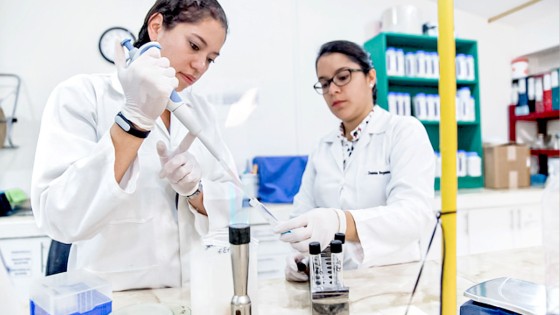PhD in Microbiology
4 years
Total credits:
90 (advanced curriculum)
120 (basic and advanced curriculum)
Monday through Friday from 7:30 a.m. to 7:00 p.m.
Saturday, Sunday and holidays (09:00 a.m. to 6:00 p.m.).
Schedule may vary according to the courses, academic attendance, rotations and time dedicated to research and thesis.
Approved on August 12, 2021
Resolution: RPC-SO-17-No.476-2021
$32,620.80
Enrolment Fee: $2,964.42
Tuition: $29,656.38
Full scholarship program.
Applies for new cohorts - academic year 2022-2023
October 29,
November 19,
December 10, 2022.
The doctoral program was created with the purpose of promoting Microbiology and scientific research in the country. The doctoral program lasts 4 years, requires intense research work and is designed for professionals with a previous scientific background. The training includes training in areas of research ethics, bioethics, and pedagogy for science education.
Graduate Profile
- Graduates of the Ph.D. program In Microbiology will complete their training with a deep understanding of modern microbiology including classical, bio-molecular and bioinformatics analytical techniques. Professionals will be specially trained to face Ecuador's problems associated with microorganisms in different fields related to human and animal health.
- These professionals must be able to collaborate (with colleagues and in an interdisciplinary way), they must be entrepreneurs, capable of assuming responsibilities of direction or supervision of research projects, diagnostic and research laboratories.
- Graduates must have a clear vision of the logical processes that lead to the formulation of a hypothesis, process analysis, project approach and the technical capacity to carry out an investigation.
- Graduates must be individuals who have demonstrated independent thinking and creativity.
- They must be aware of ethical aspects of scientific research in relation to work with human beings, and integrity in the process of reporting scientific data.
- Graduates must be able to write scientific articles and present their work in scientific forums.
- Students are expected to have an overview of the role that research in microbiology and science plays in the development of humanity.
Professional field
Graduates of this program are trained to hold positions as:
- University professors
- Scientists in microbiological research centers
- Advice in the field of scientific research
- Advice in the different branches of microbiology
- Microbiological laboratories management
Advantages
- Professors with a high level of scientific training
- Cooperation with world-renowned international research centers
- Investigation of contemporary problems of national interest
- Labs and cutting-edge technology
- Scholarship and funding possibilities
Admission Process
Basic Requirements:
- To hold a graduate degree, Master's level issued by an accredited university in the country and registered in SENESCYT, in the fields of Microbiology, Biology, or in related areas such as: Immunology, Infectious Diseases, Microbial Biotechnology, Tropical Diseases, among others. In the case of Bachelor's degrees obtained abroad, they must be apostilled or legalized by Consular means. The University will verify that the degree corresponds to a Bachelor's program, in accordance with the current Academic Regime Regulations.
- Sufficient command of the English language equivalent to B1 of the Common European Framework of Reference for Languages.
- A copy of the Bachelor's and graduate degrees.
- A copy of the identity card or passport.
- Bachelor's, Graduate's Degree Certificate with grade average.
- Bachelor's,Graduate's Official transcript with grades
- Official record of undergraduate and postgraduate grades.
- A printed SENESCYT registration of the Bachelor's, Graduate's degrees.
- Pass the USFQ graduate admission exam. To do so, refer to the admissions process at: /admisiones/
Specific requirements:
- Three (3) academic recommendation letters. At least two of them must be written by teachers who belong to a master's program (use format provided by the graduate program).
- Application letter stating the motivation for completing the doctorate.
- Scientific article published in an indexed scientific journal (PubMed, Scopus, Latinindex) in which it is authored (or co-authored). Not a review.
- CV (use format provided by the graduate program).
- In-person interview.
Financing and Scholarships
The PhD in Microbiology program offers various types of scholarships and financial aid that are awarded according to the qualifications and performance of the applicants. This process requires a case-by-case analysis, in relation to the situation of each applicant.

